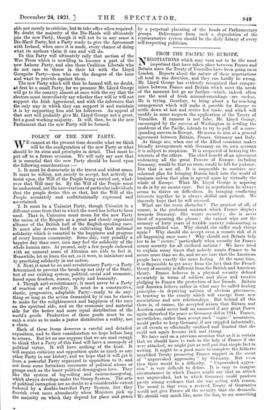POLICY OF THE NEW PARTY.
WE cannot at the present time describe what we think will be the configuration of the new Party or what should be its aims and principles in detail. That must be put off to a future occasion. We will only say now that it is essential that the new Party should be based upon the following considerations :— 1. It must be democratic in the truest and widest sense. It must be willing, not merely to accept, but actively to insist upon, the Will of the People -being carried out, what- ever that Will may be. By the Will of the People must be understood, not the asseverations of particular individuals that the people desire this or that, but the Will of the People accurately and conlititutionally expressed and ascertained.
2. It must be a Unionist Party, though Unionist in a different sense from that in which the word has hitherto been used. That is, Unionism must mean for the new Party the union of the Empire as a great and closely organized alliance of the British half of the English-speaking race. It 'must also devote itself to cultivating that national solidarity which is essential to the happiness and progress of every human community. Some day, very possibly a happier day than ours, men may feel the solidarity of the whole human race. At present, only a few people endowed with an unusual sense of Altruism are able to feel it. Meanwhile, let us learn the art, as it were, in miniature and ay practising solidarity in our nation. 3. Next, it must be an anti-revolutionary Party—a Party determined to prevent the break-up not only of the State, but of our existing system, political, social and economic, based upon freedom, reason, equity and humanity. 4. Though anti-revolutionary, it must never be a Party of reaction or of sterility. It must be a constructive, elastic, progressive, adaptable Party—ready to do any- thing so long as the action demanded by it can be shown to make for the enlightenment and happiness of the race on the spiritual side, and on the economic and material side for the better and more equal distribution of the world's goods. Production of those goods must be on such a scale as to make a juster distribution a reality, not a sham.
Each of these items deserves a careful and detailed exposition, and to their consideration we hope before long to return. But let no one suppose that we are mad enough to think that a Party of this kind will have a monopoly of political virtue. It will have nothing of the kind. It will require criticism and opposition quite as much as any other Party in our history, and we hope that it will get it from a powerful Party organized in opposition to it, and not from some fortuitous concourse of political atoms or groups such as the baser political demagogues love. They like the system of log-rolling and caucus-mongering, which always develops under the Group System. The arts of political corruption are no doubt to a considerable extent fostered by a double-barrelled Party System, but they flourish even more abundantly when Ministers pick up the majority on which they depend for place and power by a perpetual placating of the heads of Parliamentary groups. Deliverance from such a degradation of the representative system should be the daily Litany of every self-respecting politician.


































 Previous page
Previous page